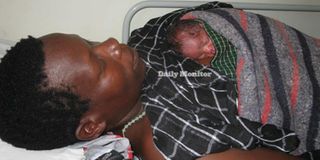Prime
Premature births on the rise yet facilities remain limited

A mother takes care of her premature baby using kangaroo care system at Aber hospital in Oyam District. Photo by Bill Oketch.
What you need to know:
The number of premature births is rising, leading to a high number of birth complications and deaths, writes Bill Oketch.
During the commemoration of World Prematurity Day last week, an alarming set of statistics was released, putting the number of babies born too soon (premature) at Lira Regional Referral Hospital in Lira District, at 70 per cent. Fortunately most of them survive.
The World Health Organisation (WHO) defines prematurity as babies born before 37 weeks from the first day of the last menstrual period. Recent data indicate that more than one in 10 babies born around the world in 2010 were premature and this translates to an estimated 15 million preterm births.
Of these, around one million babies die from complications due to prematurity.
Since 2008 to June 2015, a total admission of 3,132 children has been captured in the neonatal intensive care unit at Lira Hospital.
At least 2,343 babies had been discharged, accounting for 74.8 per cent and 789 deaths registered since 2008 (25 per cent), according to the official statistics.
Experts say complications of preterm births are the leading cause of death among children under five years of age. Without appropriate treatment, those who survive often face lifelong disabilities, including learning, visual and hearing problems and their quality of life is greatly affected.
Speaking at the World Prematurity Day on November 17, Dr Margaret Nakakeeto, a neonatologist at the Ministry of Health, said the main causes of prematurity in the country include malaria and hypertension in pregnancy.
Another cause is multiple pregnancies; when you have more than one baby in your uterus then you are likely to have an early birth.
A mother in Lira confirmed she had three babies in her uterus and none of them weighed a kilo.
Dr Nakakeeto said a lot has been done though she acknowledged more interventions need to be put in place to make sure that the babies survive.
The theme of this year’s celebration was “Harnessing the power of communities and partnerships to prevent preterm birth and improve preterm care in Uganda”.
Dr Patricia Pirio, a newborn specialist with Save the Children Uganda, recommended that the preterm baby is kept in body contact for at least 20 hours. She further explained that it is not only the mothers who can do this but fathers as well. After all, men’s bodies produce more heat because they are muscular.
“Avoid some traditional practices that predispose babies to infections such as using herbs or unclean materials to clean the (umbilical) cord,” she advised.
“And then we are also talking about nutrition; express breastfeeding but starting within one hour of delivery to ensure that babies get nutrition early and they don’t suffer low sugar level because that is the leading cause of death. Other benefits that come from nutrition include protection from infections and also improving the wellbeing for the mother.”
With birth complications, a mother is advised to keep regular contact with the health workers so as to receive obstetric care and neonatal resuscitation. As far as neonatal infections are concerned, infection prevention is encouraged, proper breastfeeding, and case management of neonatal sepsis comes in handy.
When premature babies are born, almost all parents have some fear that their baby will die.
No one in their right mind would want to experience the following sequence of events: mother on bed rest, an emergency c-section, fearing that mother and baby might die, hearing bad news about the baby’s health, worrying about the rest of your family and facing huge amounts of liability.
Even taking a healthy premature baby home is a source of stress. Parents who are sad because some of this has happened are having very normal feelings. Sadness and depression may become excessive, however.




